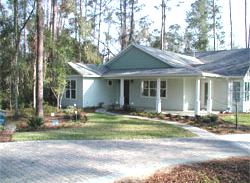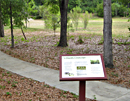Madera is designed with the idea that people and nature can coexist. Residents have many opportunities to learn about and explore their environment. For example, with lakes and natural areas nearby, one can hear and see a variety of wildlife species. The connection between humans and nature is an important one. Our economy, culture, and even politics are closely tied to the environment. Many Floridians wish to preserve our natural heritage and conserve natural resources for future generations, and each person can make a difference.
 The
goal of this website is to provide environmental information so that
each homeowner can make informed decisions and take action. Many features
in Madera make it one step closer to becoming a community that conserves
natural resources (e.g., water, energy, and wildlife). Construction
of energy-efficient homes and buildings, preservation of open space,
landscaping with natives, and conservation of natural areas and wildlife
are just a few ways Madera is such a unique place.
The
goal of this website is to provide environmental information so that
each homeowner can make informed decisions and take action. Many features
in Madera make it one step closer to becoming a community that conserves
natural resources (e.g., water, energy, and wildlife). Construction
of energy-efficient homes and buildings, preservation of open space,
landscaping with natives, and conservation of natural areas and wildlife
are just a few ways Madera is such a unique place.
However, in order for Madera to function as a “green”
community, each resident must make a conscious effort to environmentally
manage their homes, yards, and neighborhoods. We invite you to learn
more – please click on the subjects below.
Live sustainably in Madera

|
Using Water Wisely Improve your water use practices and save money by following some water conservation tips. |

|
Energy Efficient Living Benefit from positive cash flow, improved comfort, better indoor air quality, and reduced moisture problems. |

|
Managing
Household Waste Reduce, reuse, and recycle to help limit waste. |
 |
Landscaping for the Environment Landscaping for a Florida yard provides habitat for wildlife and helps to reduce your water and energy bills. |

|
Meet
your Wild Neighbors Learn to identify some of the animals you share your neighborhood with. |

|
Madera's
Natural History Florida's valuable assets include its' natural history and diverse ecosystems. |


